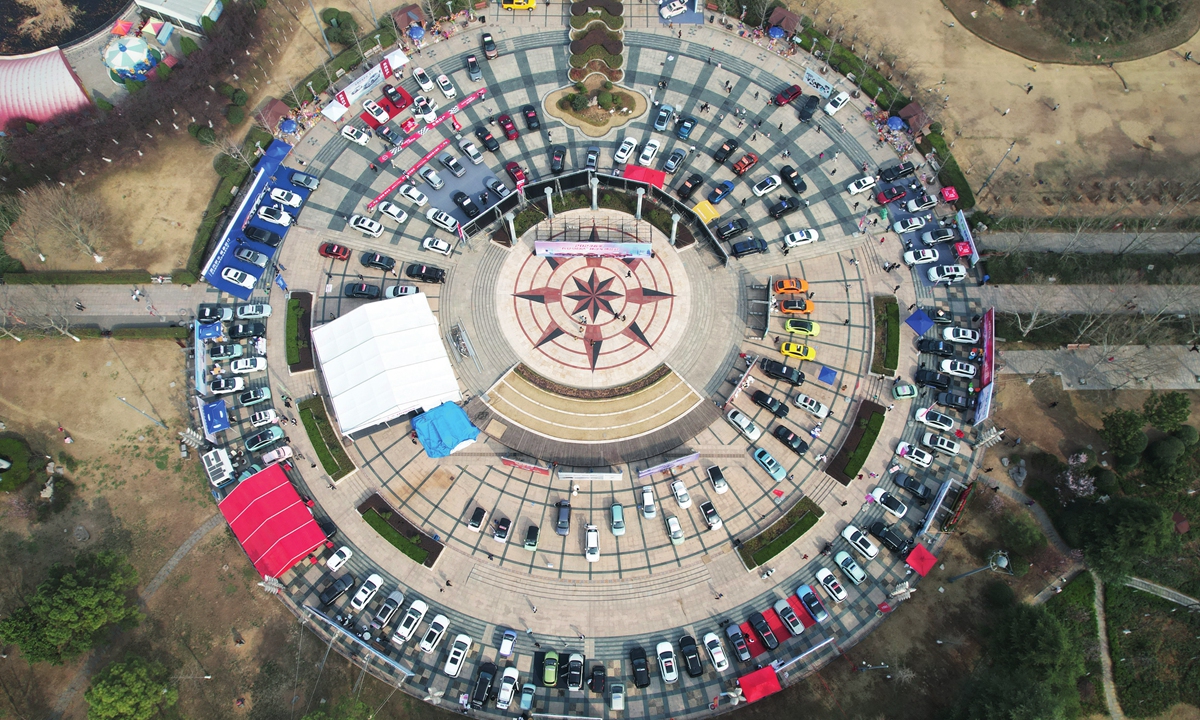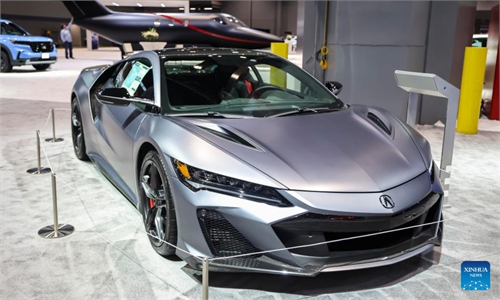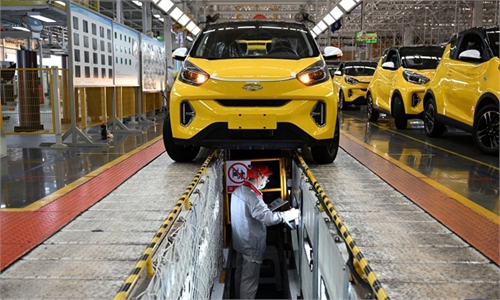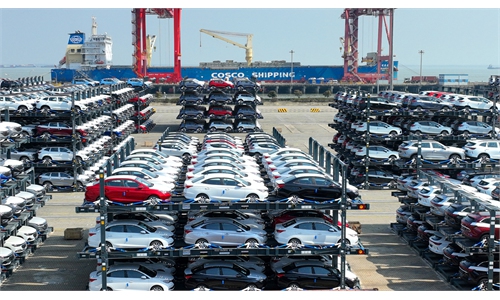Chinese automakers offer hefty discounts, other benefits to boost consumption
NEVs estimated to take upper hand in market competition: experts

Citizens attend an auto show at a park in Lianyungang, East China's Jiangsu Province on March 11, 2023. Photo: VCG
Recently, automakers in Hubei Province, Central China, launched what experts said the most drastic car promotional drive in history.
According to thepaper.cn, consumers purchasing certain car brands under the Dongfeng Motor Group, a leading automaker in Hubei, can enjoy 90,000 yuan ($12,930) in price cuts with subsidies offered by the local government and car enterprises.
The price reductions have extended to 56 types of cars under Dongfeng Motor Group. The most heavily discounted model is Dongfeng Citroen C6. While the official guidance price of the model is 216,800 yuan, consumers can enjoy a comprehensive discount of 90,000 yuan - jointly borne by the manufacturer and the government.
Lured by the unprecedented subsidies, consumers are pouring into the company's 4S showrooms.
"Dongfeng Citroens are sold out in our store," a Dongfeng 4S store salesperson in Hubei told the Global Times. "The number of customers entering the store to consult and place orders has tripled in the past several days."
The scale of 90,000 yuan discount for car purchases is unprecedented and shows the province's determination to stabilize and promote car consumption, Cui Dongshu, secretary general of China Passenger Car Association (CPCA), told the Global Times.
The promotion will have an exemplary role and radiate to the surrounding areas in a short period of time, causing a spill-over effect on the surrounding areas, Cui said.
"Other provinces are likely to follow suit. The introduction of car subsidies will give strong support to the country's car sales in the first quarter," Cui said.
Massive discount
Following Dongfeng Motor, other car manufacturers have joined the price war. According to incomplete statistics from Red Star Capital Ventures, at least 30 automobile brands have participated in the price war so far, with the highest discount offered hitting more than 100,000 yuan.
Dozens of provinces and cities, including Shanghai, Zhejiang, Henan, and Sichuan have followed up with relevant policies to promote auto consumption.
Tianjin city, for instance, issued 60 million yuan in auto purchase vouchers and East China's Shandong Province issued 200 million yuan in auto vouchers. Northeast China's Jilin Province said consumers who buy cars under the FAW Group's brands in the province can obtain subsidies of up to 37,000 yuan.
Beijing and Shanghai have recently announced extensions of subsidies for the purchase of new-energy vehicles.
Rising car sales coincide with the country's push to boost domestic consumption, Zhang Xiang, visiting professor with the Engineering Department of Huanghe Science and Technology University, told the Global Times. "Car consumption will be an important driver to revive economic growth this year," Zhang said.
From the price reduction of Tesla at the beginning of this year, to the recent series of promotions in Hubei, price reduction has become a trend in the Chinese passenger car market. Prices of new-energy vehicles (NEVs) are also reduced.
Fierce competition
Experts noted that charging convenience, range, and after-sale service are the main factors consumers consider when choosing between combustion-engine cars and NEVs.
"I prefer NEV because driving a fuel car required maintenance from time to time, which is also of significant expense. I also enjoy the experience of driving an electric vehicle," a car buyer in Beijing surnamed Tian told the Global Times on Sunday.
Chen Shihua, deputy secretary general of the China Association of Automobile Manufacturers, said that a moderate reduction in product prices is conducive to stimulating consumer demand, but a simple price cut is never the long-term solution.
"Auto enterprises should launch more products in line with the trend of industrial development to maintain healthy market competition, and ramp up efforts to improve product technology, quality, service, and brand prestige," Chen noted.
According to industry insiders, sales of fuel cars will keep dropping commensurate to the overall increased shrinkage of the traditional car market over the last five years, as characterized by higher production costs. NEV driving has become a major trend among the consumers.
In February this year, retail sales of passenger cars reached 1.39 million units, up 10.4 percent year-on-year, of which domestic retail sales of NEVs reached 439,000 units, an increase of 61.0 percent, according to data released by CPCA.
"Amid intensifying competition, NEV brands should constantly maintain their innovations. Only through developing new models that consumers like, a carmaker can increase its market share. The key to the next phase of competition in the auto market should center on vehicle intelligence, especially in the field of smarter driving and autonomous driving," said Zhang.



